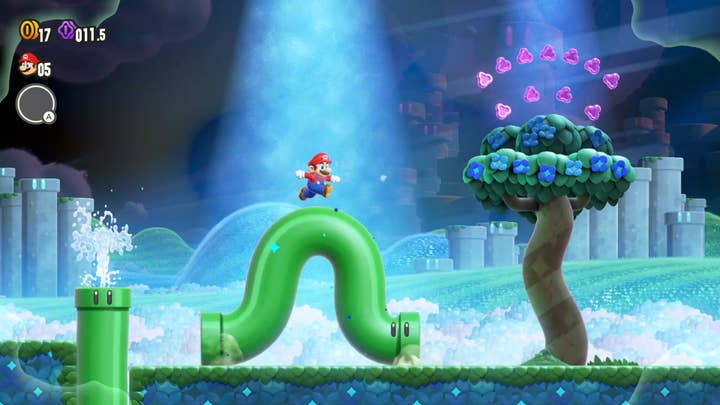Strauss Zelnick didn't say games should be priced per hour, but is he right about their value? | Opinion
The GTA 6 publisher repeats the view that premium video games offer good value for money
A story has been doing the rounds that Strauss Zelnick, the CEO of GTA publisher Take-Two, thinks games should be priced by the hour.
This has come from a quote in Take-Two's Q2 earnings call when a Goldman Sachs analyst asked Zelnick for his views on subscription pricing in the broader entertainment market.
Zelnick's answer actually doesn't suggest games should be priced hourly. Instead, his response is simply the same long-held view from executives in this business that video games (broadly speaking) are good value for money because of the depth and, yes, length of the experience.
Here's the quote: "In terms of pricing for any entertainment property, basically the algorithm is the value of the expected entertainment usage, which is to say that the per-hour value times the number of expected hours, plus the terminal value that's perceived by the customer in ownership if the title is owned or subscribed to. And, you'll see that, that bears out in every kind of entertainment vehicle.
"By that standard, our frontline prices are still very, very low because we offer many hours of engagement. The value of the engagement is very high. So, I think the industry, as a whole, offers a terrific price-to-value opportunity for consumers. That doesn't necessarily mean that the industry has pricing power or wants to have pricing power. However, there is a great deal of value offered. And look, it's our strategy here to deliver much more value than what we charge consumers. It's always been our strategy here. We want to make sure the experience is first-class, and the nature of the experience is not just the quality of what we offer, it's also what you pay for it, everyone knows that anecdotally."
"Our frontline prices are still very, very low because we offer many hours of engagement"
Strauss Zelnick, Take-Two
Zelnick is speaking to the idea that video games are worth the asking price because of the amount of entertainment you're getting out of them. 80 hours of gameplay in GTA 5 for $60 is better value for money than two hours of the Barbie movie for $12, for example.
Now Zelnick is talking about games generally. He's not arguing that Spider-Man 2 should be cheaper than Baldur's Gate 3 because of its length. But even so, is he right? Is the amount of hours of entertainment a major consideration for gamers when it comes to their value perception?
It's worth noting that value is a complicated concept that differs by person, product and brand. Ask a gamer what they think about buying a mobile game for $10 and how they feel about spending $70 on a console game, and you'll likely get a different answer, for example.
Looking at the data, and it seems clear that quality games that last a while tend to do very well. I've picked some of this year's biggest selling games and put them into HowLongToBeat to get an idea of how much gameplay is in each one, and they're all chunky experiences. Hogwarts Legacy has 68 hours of gameplay, The Legend of Zelda: Tears of the Kingdom could last you 237 hours, Diablo 4 163 hours, Baldur's Gate 3 142 hours and Starfield 154 hours. There are exceptions: Spider-Man 2 has 28 hours of gameplay in it, and Super Mario Bros Wonder is estimated at under 20 hours, and both have got off to very strong starts.
Yet even these 'shorter' games offer strong value by Zelnick's measure (and to be clear, Zelnick isn't alone in his analysis). 18 hours of Mario at $60 still works out at under $3.50 an hour. There's a legitimate argument to be made that a parent would get a better deal buying that game for the family, than they would taking the kids to see the Paw Patrol movie.

There's anecdotal evidence, too. One of my favourite examples is Super Mario 3D All-Stars on Nintendo Switch. This was a collection of three 3D Mario games released in 2020. There was criticism from fans and critics around the apparent lack of effort put into making the game, yet Nintendo still charged full price. The criticism was that Nintendo hadn't spent enough money or devoted enough resources to justify the cost.
And yet it was three great games with a combined total of more than 80 hours of gameplay. The collection shifted nine million copies in three months. For those nine million, the value was in the length and quality of the games, not in how much budget Nintendo spent on it.
There's plenty of evidence that suggests length is a factor in deciding whether a game is worth the asking price. The challenge for developers is acknowledging that, whilst avoiding the temptation to pad out the experience to satisfy that demand. After all, quality is equally as important in Zelnick's equation. It doesn't matter how long your game is if it isn't any good.
But why is this conversation important anyway? Well, its significance comes in relation to the current economic climate. GfK's consumer confidence index fell nine points in October, all of which is due to the cost-of-living, war in the Middle East and growing unease worldwide. 39% of respondents to their survey expected their household financial position to worsen over the coming 12 months. And this will influence their spending habits this Holiday period.
The last time the economy was in this situation (the 2007 – 2008 financial crisis) video games performed relatively well. The explanation back then is the same argument that is being made now… games were just good value for money. When things got tough, it was holidays, cinema trips and meals out that were cut back, while video games proved to be a good value alternative.
Yet it's dangerous to assume that what was true then is true now. Not only are consoles and games more expensive today than they were 15 years again, but there is arguably better-value entertainment out there. You can get thousands of hours of Disney films and TV for $8 a month right now, which looks like a better use of the family budget than $60 for a Mario game.
"$8 a month for Disney+ is arguably a better use of the family budget than $60 for a Mario game"
Equally, the rise of AAA free-to-play games like Fortnite is new competition for the premium games market that didn't exist during the last economic crisis.
Subscription prices are rising, in part because the model isn't proving particularly sustainable. And free-to-play experiences are quite different to their premium counterparts. But nevertheless, if the economy is forcing people to be more mindful about their spend, there are more cost-effective forms of entertainment out there than full priced video games, certainly compared with 15 years ago.
Furthermore, the COVID-19 lockdowns remain fresh in the memory. How willing are people to forgo things like holidays or meals out so soon after being forced to stay at home for over a year?
I don't propose to know the answer. But I am wary of assuming that just because premium video games proved resilient in the face of economic turmoil before, that it will again.
Zelnick isn't suggesting video games should be priced by the hour. He's arguing that because video games are typically longer forms of entertainment, then they offer better value on a 'per-hour' basis than other forms of entertainment. And that's something that will prove important when customers are being mindful of their spending.
We'll have to wait and see if he's right.









